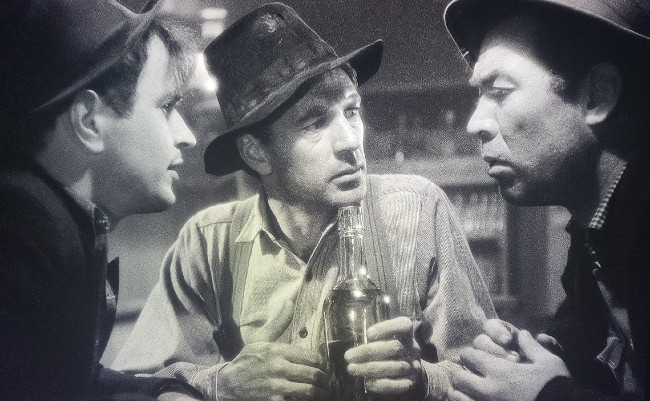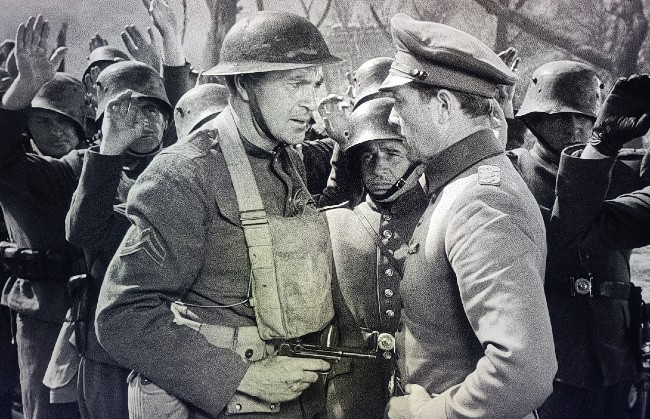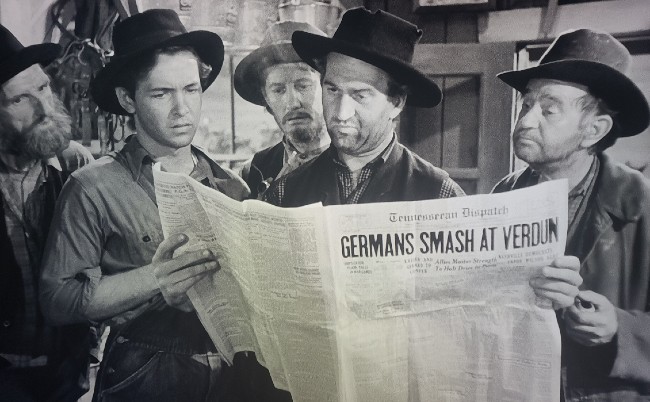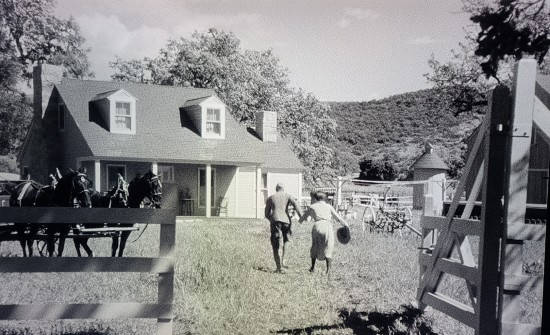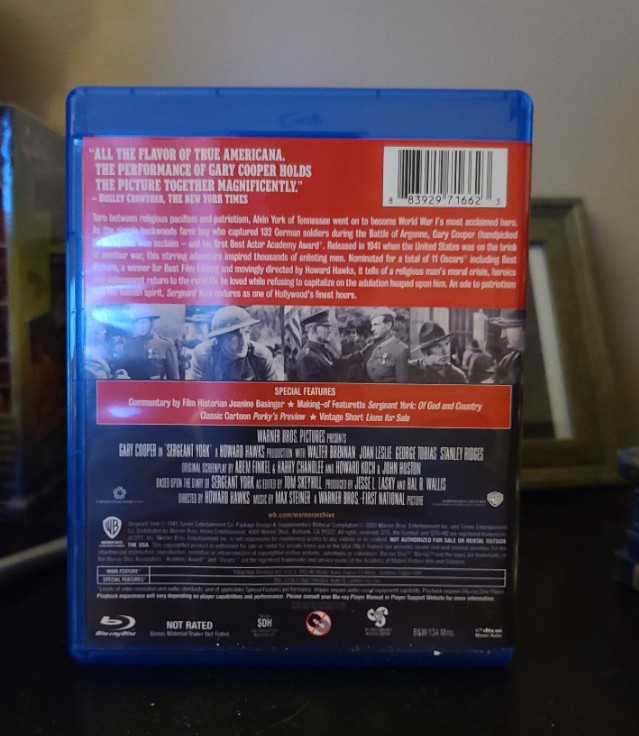Sergeant York And World War II Propaganda
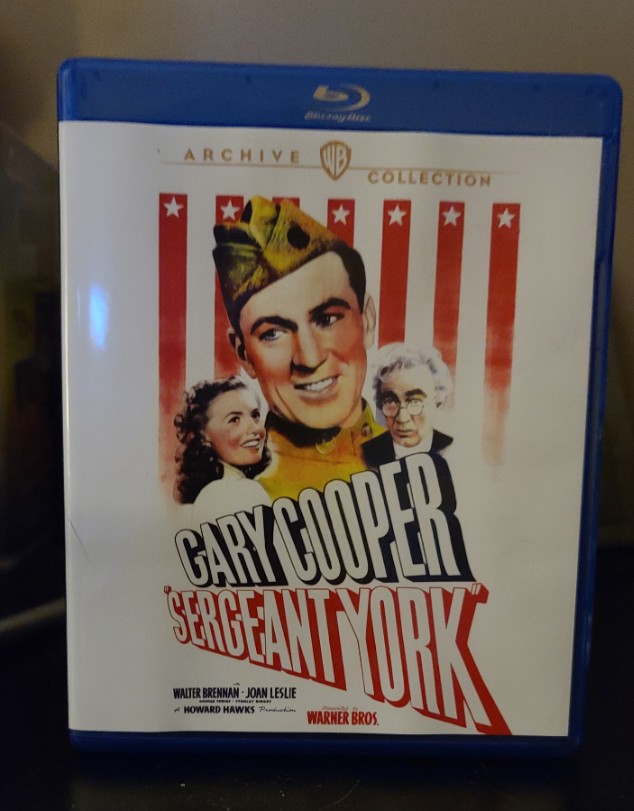
Our journey through the National Film Registry takes us to the mountains of Tennessee to the trenches of Word War I France with Howard Hawk’s Sergeant York.
WORLD WAR I
To say World War I started only because Serbians assassinated Archduke Franz Ferdinand is an over simplification of a much bigger issue. It’s a high school textbook reason that ignores the broader geo-political realities of the time and the personalities involved. It doesn’t explain why nine million soldiers died and more than roughly 10 million civilians died. No matter what explanation one has been taught the fact remains that in July 2014 Europe found itself in a war many people thought would be contained in the Balkans.
While the rest of the world fought each other the United States tried to remain out of the war. The United States’s had a policy of isolation which was fluid at best. In 1898, The United States found itself embroiled in a war with Spain. The Spanish-American war gave the United States colonies in the Caribbean and in Asia, and a base in Hawaii. However in 1917, after months of unrestricted U-boat warfare in the Atlantic, a purposed treaty between Germany and Mexico, and “for democracy,” the United States entered the war.
Woodrow Wilson enacted the draft. More than 4 million men, not all drafted, would serve in the American Expeditionary Forces during the course of the war. Many of these soldiers found themselves in the trenches of France, the Western Front, where a stalemate had developed between the Allies and Germany. It was in these trenches Alvin York found himself in when he landed in Europe.
Sergeant York is, as the title implies, the story of Alvin York. It’s a simple story with a roughly two hour run time. York, born in the mountains of Tennessee, has a religious conversion after a lifetime of drinking and being a troublemaker. When the hands of the draft board reach Pall Mall, Tennessee York declares he’s a conscientious objector. Reluctantly, York reports for duty and after a brief moment of soul searching decides to stay in the army where he would go on to be one of the most decorated soldiers in World War I.
WORLD WAR II
By September of 1941, the month Sergeant York was released and two months before the Japanese would attack the naval base at Pearl Harbor, Germany had already annexed western Poland and invaded France, Denmark, the Netherlands, and Belgium. London had survived the Battle of Britain (also known as the Blitz). Although still neutral, the United States had already been supplying both Britain and Russia the materiel for war- ammunition, weapons, ships, clothes.
President Franklin D. Roosevelt had increased the size of the United States Navy, recalled the army reserves for a one year active duty status, and had enacted the first peacetime draft. The United States had stationed Marines in Iceland and Greenland. It lifted restrictions on commercial shipping after several unprovoked attacks by German submarines and the auto industry had retooled its normal operations to wartime production.
The United States was funding a war against Germany without actually being an active participant in the war. A hot war between the United States and Germany was being debated back and forth between politicians and Roosevelt and between Americans alike. Isolationists, for various reason, wanted to stay out of the war in Europe. Non-Isolationists wanted a war to save democracy and the United States. Parties on both sides of the issues used propaganda of all kinds to further their arguments.
MOVIES AS PROPAGANDA
Hollywood has a history of propaganda posing as movies. Sergeant York fits squarely into that description. On its face, Sergeant York is a simple an abbreviated bio-pic. Just below the surface is one of the best propaganda movies to be released in the ’40s.
Early in the movie a salesman is trying to sell Pastor Pile (Walter Brennan), owner of the only general store in Pall Mall, women’s garments. The salesman asks the men hanging out in the store how they got into the valley. The answer is brief, “We were born here.” The movie is establishing that the residents of the Valley of the Three Forks of the Wolf River are isolated from the rest of the United States.
The men don’t show any concern when the salesman tells them the Germans may reach Paris. Historically, the people living in the Tennessee mountains weren’t fond of getting involved in outside affairs or having outsiders getting into their affairs. The war was somewhere else and it was someone else’s concern. They wanted to be left alone. As isolated as the community is the residents are quick to join the military when the draft board comes knocking on their doors. Zeke, an old farmer, laments that he can’t go to war saying “Sure wish I was a young fella.” Even the isolationists are ready to fight the Germans in a place they’ve never heard of before on a different continent.
York is the loan dissenter in the community. York, like Saul on the road to Damascus, is hit by lighting on his way back from drinking with friends. The barrel of his rifle is bent and smoking in the mud. York readily embraces the teachings of the bible and of God. One of those rules is “Thou Shall Not Kill.” York argues to the draft board he can’t join the army because the army would ask him to kill. Eventually, he loses his battle with the draft board and heads to boot camp for training.
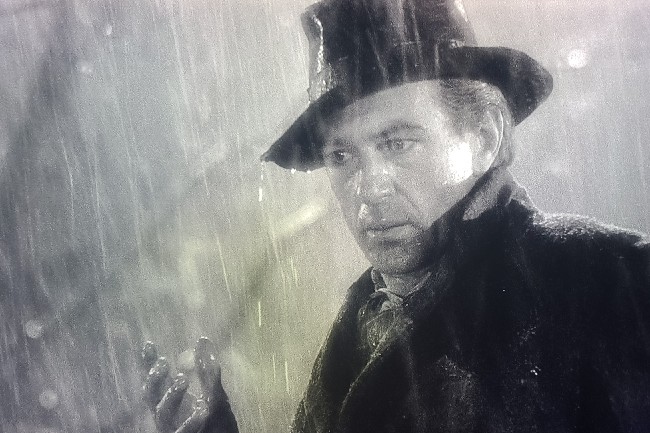
Boot camp is treated almost as a comedic affair where York is teased about having never heard of or been on a subway. The drill instructors though are harder on York than the his fellow soldiers. They poke jabs at York about his pacifism and tease him about how to not to use a rifle. It’s the distrust of the conscientious objector. Can someone who doesn’t want to fight be trusted? Can the isolationist, someone who is against killing, be trusted when and if war breaks out? Later, York thrills the unit with his shooting skills.
Two books are prominently featured in Sergeant York. The first book is the bible and the second book is The History of the United States. The movie, from the beginning, had already established a strong Christian motif. Even before Pastor Pile was sending letters to the draft board on York’s behalf he was trying to get him to forsake his evil ways and return to church. It’s no surprise when the bible is brought out in boot camp (There’s no atheists in the foxhole).
Captain Danforth, one of York’s superior officers at boot camp, and York trade bible verses. Major Buxton, York’s commanding officer, brings him The History of the United States. It’s a heavy handed scene with only one goal. The scene is there to say killing in war is okay because you’re fighting for freedom and for God. Though the movie does not come out and say it the implication is that God is on the side of the United States, God is an American.
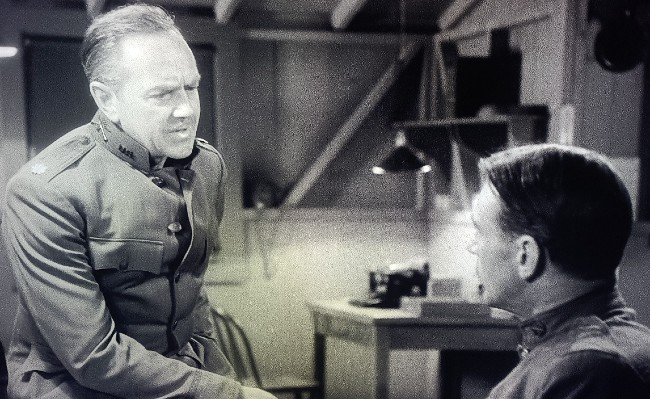
While on leave back home York contemplates, with the bible in one hand and The History of the United States in the other hand, what the officers have told him. It’s not the bible he clutches to his chest as looks towards the sky and the light is shining down on him it’s The History of the United States. Back at boot camp York tells Major Buxton he’s ready to trust “in something a heap bigger” than himself.
After boot camp York and his division are sent to the Western front during the The Meuse–Argonne offensive (1918). “You Yanks just got here in the nick of time” an English soldier tells them as bombs explode around their foxhole. York would prove them correct as he and a few other American soldiers captured more than 130 German soldiers in one day.
At the end, Major Buxton says to York he knew York was ready to die for his county but wasn’t sure if he would kill for his country. York explains to Major Buxton by killing Germans he was saving other soldier’s lives. He’s rationalizing the taking of human lives in a way even those against war would be hard pressed to argue against.
York is award medals by France, England, and the United States. New York City gives him the key to the city. The state of Tennessee built him a beautiful new house in Pall Mall, Tennessee on 200 hundred acres of land. The legend of Alvin York started in Europe and grew in the United States.
Gary Cooper beat out both Orson Welles and Cary Grant, for the best actor Oscar at the 1942 Academy Awards. Comparing nominated performances is never an apples to apples comparison. Orson Welles’s Charles Foster Kane was a career defining role for Welles and Citizen Kane has been called one of the greatest American movies ever made. Cooper’s performance, in comparison to Welles, was subdued and calm. It could be argued that Cooper’s down-home portrayal won the hearts of voters, but it’s more than likely he won because the United States having just entered World War II needed a hero. American heroes didn’t get more heroic than Alvin C. York.
SPECIAL FEATURES
Sergeant York use to be a staple on TCM (Turner Classic Movies). The picture quality wasn’t the best. The grainy film broadcast on television did not age well. Warner Archive has now released a beautiful restoration of Sergeant York on Blu-ray.
The special features include commentary by Jeanine Basinger. Basinger is a professor of film studies at Wesleyan University. She’s written several books on film including A Woman’s View: How Hollywood Spoke to Women 1930-1960. Needless to say the commentary is not only entertaining but very informative. There’s also a cartoon and the standard making of featurette.

